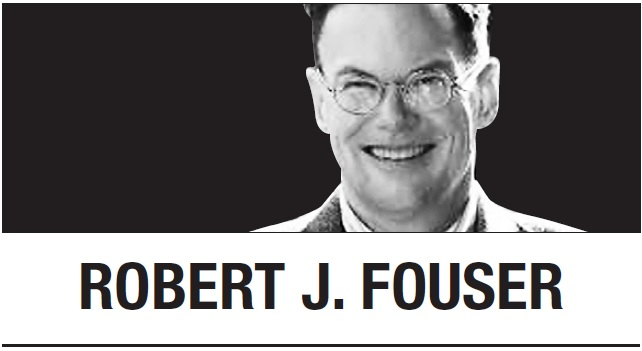[Robert J. Fouser] Shifting from university entrance to exit
By Korea HeraldPublished : June 30, 2023 - 05:31

A recent controversy over the difficulty of the Suneung, the nationwide college scholastic ability test, has raised concerns about the effects of the exam. Difficult “killer questions” that require skills and knowledge that go beyond the high school curriculum intimidate students and force them to turn to private cram schools for extra exam preparation.
The burden on families for the cost of private education is a longstanding issue that previous presidential administrations have tried to address but with little success. Like previous administrations, the current one has proposed stricter oversight over the production of the Suneung and of private cram schools, known locally as hagwon. The administration has also proposed to offer financial support for exam preparation classes in school.
As in the past, however, attempts to lower the difficulty of the Suneung have raised concerns about “dumbing down” of education. More broadly, critics are skeptical that the proposals will do much to reduce the influence of private education. This raises the question of what, if anything, can be done.
The core of the problem is, as it always has been, the use of an examination for university entrance. South Korea is not the only country, of course, to adopt such a system. Japan has long been famous for university entrance examinations and in the US the SAT became popular in the 1950s with a boom in higher education. By contrast, most European countries require high school diplomas combined with other documents, such as transcripts and, in some cases, results from examinations that measure competence over material taught in high school.
In South Korea, Japan and (to a lesser degree) the US, university entrance exams function as gatekeepers designed to highlight differences among students so the elite institutions can choose high-performing students who go on to become members of the managerial professional class. In Europe, exit qualifications create a binary distinction between students who are qualified and those who are not. In many European countries, qualified students are guaranteed a place, often in a nearby university. Universities in these countries have different specialties but are largely similar in quality and prestige, and these countries lack the reputational hierarchy that dominates countries with entrance exams.
Eliminating the Suneung entirely and switching to European-style exit qualifications would be a monumental reform that would undermine the need for private cram schools. It would put school education back at the center of student life because students would focus on what they do in school instead of preparation for entrance examinations. Instead of the Suneung, for example, universities could require students to show proof of graduation and a portfolio of documents including grades, recommendations and records of participation in extracurricular activities. Beyond requiring high school graduation, universities and departments within universities should be free to set the weight of various factors and to require additional measures, such as an interview.
This change, however, may not be enough to reduce the burden of private education. Suneung hagwon would disappear, but schools designed to help students with school material and extracurricular activities. Many students doing sports or music, for example, would turn to the private education market for extra help.
This points to the prime mover of South Korean education: hierarchy. As long as universities are organized into a rank-based hierarchy, students will compete to enter higher-ranking universities that facilitate entrance into managerial professional class. Without the hierarchy, the influence of the entrance examination would be far less.
Demographic changes make leveling the hierarchy easier now, because the number of universities that have more seats than applicants continue to rise. Many universities are facing financial difficulties and, as the pool of students continues to shrink, many will close their doors. Entrance to elite universities remains highly competitive, but less than in the past for majors that are unpopular with employers.
Restructuring of the entire sector, which includes nationalization of private universities, is the best way to manage the impending crisis. Public funding combined with restructuring would help leveling and allow for a more efficient use of resources. Instead of choosing universities for their rank, students would choose them for the specialty and location. With nearly open admissions, the focus would shift from entrance to exit to measure what students learn while in university.
The process of leveling would be chaotic and meet much resistance at first, but freeing future generations from a rigid hierarchy would be worth it. It would also reinvigorate university life, as the focus shifts from the name on the diploma to the content of the university experience.
Robert J. Fouser
Robert J. Fouser, a former associate professor of Korean language education at Seoul National University, writes on Korea from Providence, Rhode Island. He can be reached at robertjfouser@gmail.com. -- Ed.
-
Articles by Korea Herald



















![[Today’s K-pop] Treasure to publish magazine for debut anniversary](http://res.heraldm.com/phpwas/restmb_idxmake.php?idx=642&simg=/content/image/2024/07/26/20240726050551_0.jpg&u=)